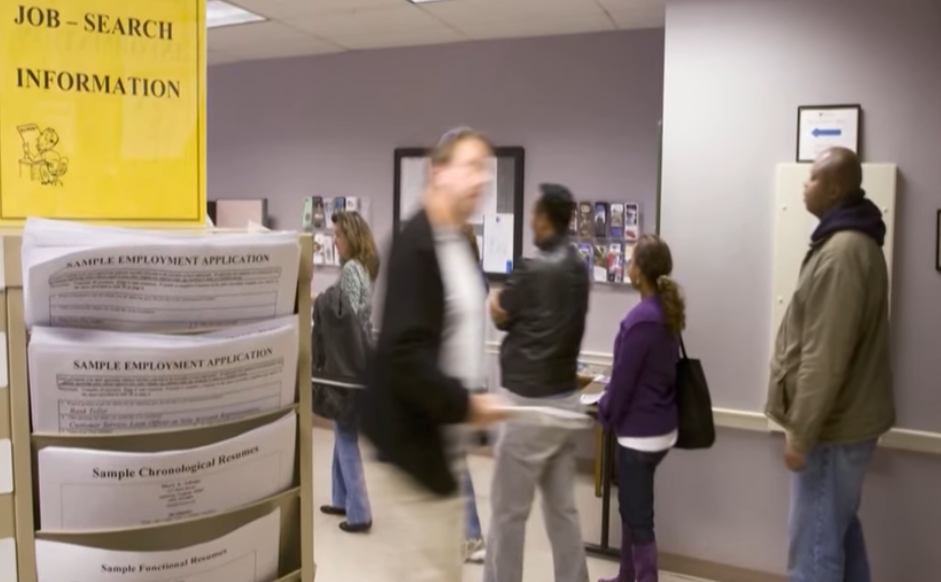Man out of work for over two years displays T-shirt at march on US Capitol.
African Americans are still at the bottom of the totem pole when it comes to inequality in economics across the nation, as the website, The Beat, reminds those who would like to forget, in a recent article.
In February the unemployment rate for African-Americans was 10.4 percent, while the comparable rates for whites, Hispanics and Asians were 4.7 percent, 6.6 percent and 4.0 percent, in that order, according to data released by the U.S. Bureau of Labor Statistics.
Across the American economy, the dominant story during the past several months has been a sustained recovery that resuscitated a dormant job market and the accompanying unemployment rate that has plunged below pre-Great Recession levels. But if better days are here for many workers, this feeling is shared to a lesser degree by African-Americans, whose unemployment rate is still considered high and has long been double the rate for whites.
Among black working-age people, however, the unemployment rate since February 2014 has dropped more quickly than among nonblack workers.
On the surface, that improvement should signal a triumph, but an asterisk, given the fact that nonblack workers’ unemployment rates fell much earlier and faster during the recovery, accompanies it. Government data indicates recent job creation has been less beneficial to African-American workers when compared with whites, Asians and Hispanics. Blacks had more ground to make up, and their labor-force representation is skewed toward lower-wage industries in which there are higher turnover rates, one study found.
These clear-cut differences mean that for people such as Darensbourg, who has been out of work for periods of several months or several years, other factors exaggerate the length of their unemployment.
Many African-Americans find it hard to dismiss completely the role that race plays in their difficulty finding work, even with federal laws making discrimination illegal.
Studies have found that even when black applicants possess qualifications that are on par with white applicants, variables as simple as their names or as complex as the breadth of their professional networks can many times hold them back.
“I’ve never felt secure, in my entire adult life working,” said Darensbourg, who is married with two kids and living with his family in a New York apartment. After the 9/11 terrorist attacks in 2001 eliminated his management-level job at a restaurant located within the no-traffic zone, he was forced to look for work in other restaurants, which he said would not pay him at his previous annual salary of nearly six figures.
“I’ve been in disbelief,” said Darensbourg, a 6-foot-5-inch, 220-pound man who is often told his presence is at worst intimidating and at best unforgettable. During an interview for a job, he was certain he would get, he recalled feeling his younger, white, female interviewer was put off by his size and confidence. “Over time, I didn’t know what to do,” he said of the experience.
“People in my situation are giving up. They are just adapting their lives to where they are. I’m not thinking about trying to buy a home or going on vacation. I don’t know how retirement is going to work,” Darensbourg said.
The experience of joblessness for African-Americans can have a lasting effect on their economic mobility, according to the Center for Popular Democracy, a liberal think tank in New York that released a report on black unemployment two months ago. It was prepared with the technical assistance of the nonpartisan Economic Policy Institute in Washington. On an hourly basis during the past 15 years, black workers’ wages have fallen by 44 cents, while Hispanic and white workers’ wages have risen by 48 cents and 45 cents, respectively, according to the report. Black wealth has also shrunk, while Hispanic and white wealth has stabilized.
African-Americans who have achieved higher-education degrees — a key investment leading to the middle class — still find themselves more likely to face long-term unemployment than their white, Hispanic and Asian counterparts. According to the Center for Popular Democracy’s study, the only proven solution to this problem are those Fed programs that ideally stimulate job creation for workers of all experience and skill levels. Nevertheless, that still has not been robust enough to help the broadest swath of African-American workers.
“I’m pushing my kids to do way better than I did in school,” Darensbourg . “I can’t pay for them to go to school. I don’t know how that would happen unless they got a scholarship. I tell my daughter that she is not just competing with the kids at her school; she’s competing with the whole world. I try to have them see stuff that my parents didn’t show me.”





